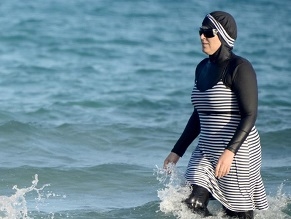|
World Jewish News

Tunisian women wearing a ''burkini. (photo credit:FETHI BELAID/AFP)
|
Prominent Paris rabbi defends controversial burkini ban
24.08.2016, Jews and Society Prominent members of France’s Jewish community defended a string of controversial municipal bans on wearing the full-body swimsuit known as the burkini, which they have branded as political.
Moshe Sebbag, the rabbi of the Grand Synagogue of Paris, told JTA on Tuesday he supported in principle the regulations adopted earlier this month in 15 French municipalities, including the famed beach resort Cannes, against the garb, which French Prime Minister Manuel Valls last week said was part of a “political project” to perpetuate female servitude.
“It’s a complicated subject and both sides have compelling arguments,” Sebbag said in an interview. While the French state is a “secular country with freedom of religion,” he said the mayors in question “understood this is not about women’s liberty to dress modestly, but a statement as to who will rule here tomorrow.
“They understand today there’s a religious war, a takeover of the secular establishment of the French republic and this is what they find unacceptable,” Sebbag said.
Asked if he agrees with the burkini bans, he said: “Yes, because you see that going with it [a burkini] is not innocent, it’s sending a message.”
Chief Chabad emissary of the French Riviera, Rabbi Yosef Pinson, went a step further, telling the The Jerusalem Post that if the law doesn’t suit someone “they should go back to a place where everybody dresses the same.”
Defense of the ban follows criticism of it by some left-wing Jews, including by the Jewish French Union for Peace – a far-left organization that supports a blanket boycott of Israel and whose co-president Pierre Stambul opposes Jewish immigration to Israel as a form of “colonization of Palestine.” His group, in a statement last week, called the burkini bans “racist to Muslims” and potentially damaging to Jewish communities. The group condemned “the silence of Christian faith leaders and especially Jewish ones.”
The issue of wearing religious costumes in the public sphere is a divisive one in France, where in 2010 the country’s Senate passed a law banning the wearing of face-covering garb such as the burka. The burka ban, which exists also in Belgium and the Netherlands, has left many Western European Jews concerned that it would lead to the passing of measures also limiting the wearing of Jewish symbols in public.
But these restrictive measures have become increasingly popular amid a proliferation of Islamic terrorist attacks, including a series of bombings in Brussels in March and the slaying of dozens of people last month in the southern French city of Nice, near Cannes.
Orthodox Jews commenting on the subject said the burkini ban was unlikely to have any affect on the local Jewish population, where women who judge it immodest to wear revealing swimsuits often find other solutions.
In France, and Paris especially, some Jewish communities arrange women-only hours with local swimming pool operators, where Jewish women either swim with typical swimwear – generally one-piece costumes and caps – or entirely avoid bathing on public beaches.
“The intention of Jewish women who dress modestly is Kiddush Hashem,” said a female member of Paris’s Orthodox Jewish community, who did not wish to be named. “This should be true for all women and men who follow the same path. When the dressing code becomes a political message, there is nothing in common. The message that is conveyed by the burkini is: the French law should be changed to allow Muslim women to bathe in religious clothes. And there is a campaign to force the French authorities to accept the burkini. Jewish women, acting with tzniut [modesty], have never tried to influence the law.” Secularism, she added, is an important French principle.
“Jews have lived in France for the past 2,000 years. They have been French citizens since the French Revolution in 1791. Jews have always been able to live their Judaism in the French Republic. French secularism is the sharing of common values and principles, which, so far, has always allowed people to live together within the respect of their religious principles.”
Echoing this sentiment, the Representative Council of French Jewish Institutions said the country’s Jews have always made efforts to comply with the law.
“Tzniut is a personal expression of piety and religious observance. There is no known case of utilization of tzniut as a political or public defiance of the law,” said CRIF executive director Robert Ejnes. “And Jews have not tried to force others into observance,” he added, saying they’d rather stay away from places where their customs may conflict with others. By JTA, TAMARA ZIEVE
JPost.com
|
|
